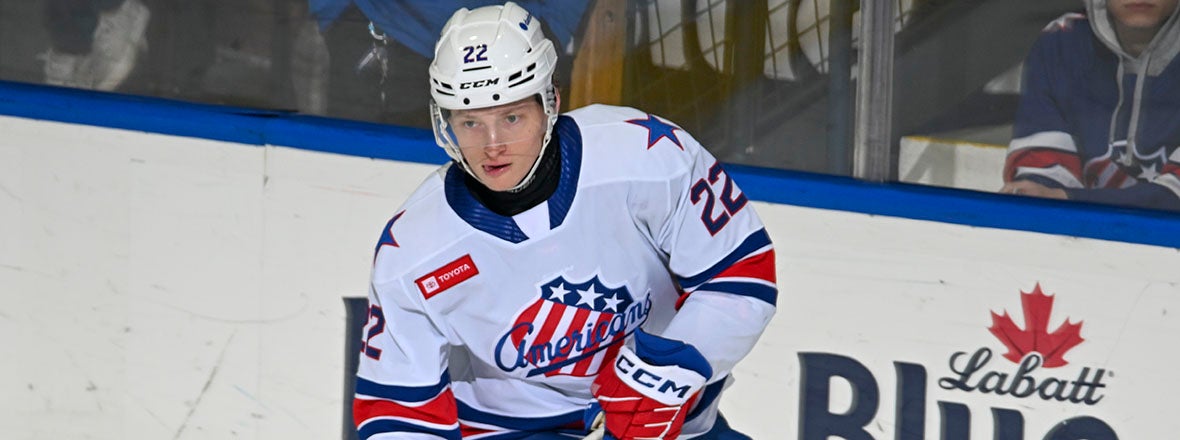
METSA: ‘IT’S FUN BEING AN UNDERDOG’
The Amerks rookie defenseman has had to ovecome adversity every step of the way in his hockey career
Mar 5, 2024![]() By Andrew Mossbrooks | @Mossbrooks48
By Andrew Mossbrooks | @Mossbrooks48
Zach Metsa is an underdog. It’s a role he’s played throughout his playing career, one which long predates his time in the red, white, and blue.
“He’s had to fight for everything in his career,” said Amerks head coach Seth Appert. “This is a guy that everybody’s written off at every stage. USHL teams didn’t want him. College teams didn’t want him. He’s captain of a National Championship team (Quinnipiac) and he’s not getting NHL offers thrown at him. He’s used to having the chip on his shoulder and proving everybody wrong with his play.”
The Rochester Americans’ first-year blueliner is in his first full professional season after first joining the team during last year’s playoff run. Despite being a rookie, Metsa is considerably older than most of his fellow first-year pros. While the highly touted NHL prospects of the world like Isak Rosen and Jiri Kulich made the jump to the AHL in their teenage years, Metsa, a Delafield, Wisconsin native, is 25 years old. When the formers were being scouted by NHL teams, Metsa was putting himself on the radar through college, capturing a National Championship last year with Quinnipiac University as its captain.
Despite the NCAA championship, being named an All-American, All-Star, Best Defensive Defenseman and more, Metsa has been overlooked due to one main uncontrollable factor: genetics. Metsa is 5-foot-9 and under 200 pounds. He is the prototypical ‘undersized defenseman.’
“That certainly plays into it for him,” said Appert. “When you’re out scouting, everybody’s out looking for Owen Power. They’re looking for big, mobile, intelligent players. There’s not many of those guys, so sometimes you reach for bigger guys that don’t have as much skill or competitiveness. That’s their trade-off and Zach’s trade-off is that he’s a little undersized, but what he gives you in his compete level, intelligence, playmaking, and the kind of teammate that he is more than makes up for lack of size.”
The former Bobcat has had an up and down season. In 35 games, Metsa has scored four goals and 11 assists for 15 points. Much of his year has been hindered by injuries and other parts have been dealing with the adjustments to being a pro.
“You got to fight for it every day,” said Metsa. “I’ve got to fight for my ice every night and fight to be on this team every day. It’s easy to kind of get down on yourself and let things snowball. I’ve realized this year that maybe I wasn’t as good mentally as I wanted to be. I’ve learned to stay present in the moment. It’s kind of like sink-or-swim and you learn things about yourself along the way. I think I’ve grown as a person while I’ve been here. It’s fun to be in the process and see where I’ve come from and where I am now.”
“He’s went through ups and downs and him and I have had talks and he’s met with ‘Paetscher’ (assistant coach Nathan Paetsch) to talk about the growth you need and the process it takes to become a great pro player,” Appert said.
The rookie defensemen is coming off a promising weekend, one in which Metsa scored a goal and collected three points across two games in Belleville. It’s a weekend he hopes to build off of.
Metsa isn’t content with where he is now. He’s hoping to keep working toward success to get him where he wants to go, and that’s to reach the ultimate goal of playing in the National Hockey League. It’s been a year that’s required perseverance for the young Amerk, but these are exactly the kind of challenges that have made Metsa the player and person he is today.
“I believe you gain a lot of resilience and strength when you go through massive amounts of adversity in your life and career,” said Appert. “Metsa has dealt with it throughout his career. He’s always met the challenge. He’s met the challenge of being overlooked in youth, junior, and college. By going through all those things, you gain a massive amount of resilience and belief in yourself because you’ve done it before.”
Metsa has experienced it all. He’s dealt with naysayers. He’s had to block out the white noise. He’s had his critics, but he’s embraced who he is: a player who has overcome odds and continues to do so every step of the way.
“It’s nice proving people wrong,” said Metsa. “Obviously, you want people to believe in you. It always sucks hearing the things you’re not good at, but you do need to hear them. But when you have people that doubt you and think you can’t do it; to be able to prove them wrong and stick it to them is such a good feeling. There were even times where I proved myself wrong. It’s fun being an underdog.”

